Although most Americans agree that the government response to Hurricane Katrina in the Gulf Coast was disastrously slow, they differ in their views of the victims and in apportioning blame. A poll conducted by Newsweek magazine shortly after the storm found that 31 percent of white Americans in contrast with 65 percent of African-Americans thought the government responded slowly because most of the people in the direct path of the storm were African-American.
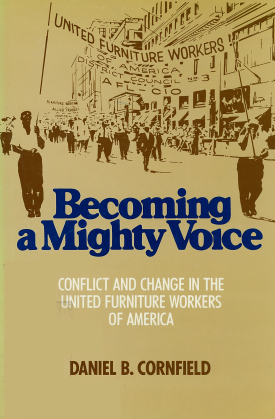
Becoming a Mighty Voice
About This Book
American labor unions resemble private representative democracies, complete with formally constituted conventions and officer election procedures. Like other democratic institutions, unions have repeatedly experienced highly charged conflicts over the integration of ethnic minorities and women into leadership positions. In Becoming a Mighty Voice, Daniel B. Cornfield traces the fifty-five-year history of the United Furniture Workers of America (UFWA), describing the emergence of new social groups into union leadership and the conditions that encouraged or inhibited those changes.
This vivid case history explores leadership change during eras of union growth, stability, and decline, not simply during isolated episodes of factionalism. Cornfield demonstrates that despite the strong forces perpetuating existing union hierarchies, leadership turnover is just as likely as leadership stagnation. He also shows that factors external to the union may influence leadership change; periods of turnover in the UFWA leadership reflected employer efforts to find cheap, non-union labor, as well as union efforts to unionize workers. When unions are threatened by intensified conflict with employers and when entrenched high status groups within the union are obliged to recruit members of lower socioeconomic status, then new social groups are likely to be integrated into union leadership.
Becoming a Mighty Voice develops a theory of leadership change that will be of interest to many engaged in the labor, civil rights, and women's movements as well as to sociologists or historians of work, gender, and race, and to students of political and organizational behavior.
DANIEL B. CORNFIELD is associate professor of sociology at Vanderbilt University.
Download
RSF Journal
View Book Series
Sign Up For Our Mailing List
Apply For Funding
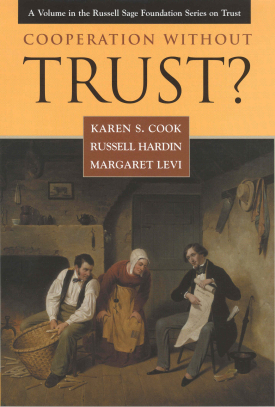
Cooperation Without Trust?
About This Book
Some social theorists claim that trust is necessary for the smooth functioning of a democratic society. Yet many recent surveys suggest that trust is on the wane in the United States. Does this foreshadow trouble for the nation? In Cooperation Without Trust? Karen Cook, Russell Hardin, and Margaret Levi argue that a society can function well in the absence of trust. Though trust is a useful element in many kinds of relationships, they contend that mutually beneficial cooperative relationships can take place without it.
Cooperation Without Trust? employs a wide range of examples illustrating how parties use mechanisms other than trust to secure cooperation. Concerns about one’s reputation, for example, could keep a person in a small community from breaching agreements. State enforcement of contracts ensures that business partners need not trust one another in order to trade. Similarly, monitoring worker behavior permits an employer to vest great responsibility in an employee without necessarily trusting that person. Cook, Hardin, and Levi discuss other mechanisms for facilitating cooperation absent trust, such as the self-regulation of professional societies, management compensation schemes, and social capital networks. In fact, the authors argue that a lack of trust—or even outright distrust—may in many circumstances be more beneficial in creating cooperation. Lack of trust motivates people to reduce risks and establish institutions that promote cooperation. A stout distrust of government prompted America’s founding fathers to establish a system in which leaders are highly accountable to their constituents, and in which checks and balances keep the behavior of government officials in line with the public will. Such institutional mechanisms are generally more dependable in securing cooperation than simple faith in the trustworthiness of others.
Cooperation Without Trust? suggests that trust may be a complement to governing institutions, not a substitute for them. Whether or not the decline in trust documented by social surveys actually indicates an erosion of trust in everyday situations, this book argues that society is not in peril. Even if we were a less trusting society, that would not mean we are a less functional one.
KAREN S. COOK is the Ray Lyman Wilbur Professor of Sociology and senior associate dean of social sciences at Stanford University.
RUSSELL HARDIN is professor of politics at New York University.
MARGARET LEVI is Jere L. Bacharach Professor of International Studies in the Department of Political Science, University of Washington, Seattle.
A Volume in the Russell Sage Foundation Series on Trust
RSF Journal
View Book Series
Sign Up For Our Mailing List
Apply For Funding
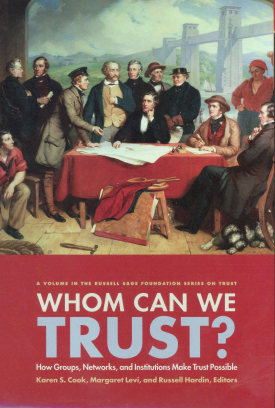
Whom Can We Trust?
About This Book
Conventional wisdom holds that trust is essential for cooperation between individuals and institutions—such as community organizations, banks, and local governments. Not necessarily so, according to editors Karen Cook, Margaret Levi, and Russell Hardin. Cooperation thrives under a variety of circum-stances. Whom Can We Trust? examines the conditions that promote or constrain trust and advances our understanding of how cooperation really works.
From interpersonal and intergroup relations to large-scale organizations, Whom Can We Trust? uses empirical research to show that the need for trust and trustworthiness as prerequisites to cooperation varies widely. Part I addresses the sources of group-based trust. One chapter focuses on the assumption—versus the reality—of trust among coethnics in Uganda. Another examines the effects of social-network position on trust and trustworthiness in urban Ghana and rural Kenya. And a third demonstrates how cooperation evolves in groups where reciprocity is the social norm. Part II asks whether there is a causal relationship between institutions and feelings of trust in individuals. What does—and doesn’t—promote trust between doctors and patients in a managed-care setting? How do poverty and mistrust figure into the relations between inner city residents and their local leaders? Part III reveals how institutions and networks create environments for trust and cooperation. Chapters in this section look at trust as credit-worthiness and the history of borrowing and lending in the Anglo-American commercial world; the influence of the perceived legitimacy of local courts in the Philippines on the trust relations between citizens and the government; and the key role of skepticism, not necessarily trust, in a well-developed democratic society.
Whom Can We Trust? unravels the intertwined functions of trust and cooperation in diverse cultural, economic, and social settings. The book provides a bold new way of thinking about how trust develops, the real limitations of trust, and when trust may not even be necessary for forging cooperation.
KAREN S. COOK is Ray Lyman Wilbur Professor of Sociology and the current chair of the sociology department at Stanford University.
MARGARET LEVI is Jere L. Bacharach Professor of International Studies in the Department of Political Science at the University of Washington, Seattle.
RUSSELL HARDIN is professor of politics at New York University.
CONTRIBUTORS: Abigail Barr, Bruce G. Carruthers, Matthew R. Cleary, Jean Enminger, Henry Farrell, Margaret Foddy, Corina Graif, James Habyarimana, Philip T. Hoffman, Macartan Humphreys, Jeffrey C. Johnson, Roderick Kramer, Stefanie Mullborn, Gabriella R. Montinola, Elinor Ostrom, Daniel N. Posner, Gilles Postel-Vinay, Jean-Laureant Rosenthal, Robert J. Sampson, Irena Stepanikova, Susan C. Stokes, David Thom, James Walker, Jeremy M. Weinstein, Toshio Yamagishi.
A Volume in the Russell Sage Foundation Series on Trust
RSF Journal
View Book Series
Sign Up For Our Mailing List
Apply For Funding
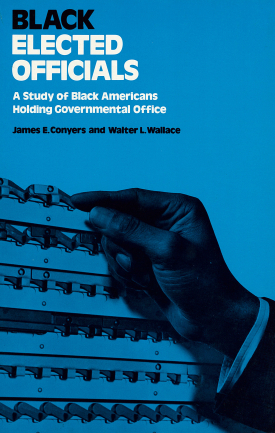
Black Elected Officials
About This Book
Presents the first nationwide profile of black Americans (over 3,500) who now hold elective governmental office. The book is based upon a questionnaire survey of black elected officials together with a comparison survey of white men and women elected to similar types of offices in the same geographical region. The inclusion of extensive quotations from interviews with thirty-four black elected officials adds realism, depth, and insight to the quantitative analysis. The authors interrelate fresh and meaningful information on the political ideologies and motivations of black officials, their perceived political impacts, and expectations for the future.
JAMES E. CONYERS is professor of sociology at Indiana State University.
WALTER L. WALLACE is professor of sociology at Princeton University.
Download
RSF Journal
View Book Series
Sign Up For Our Mailing List
Apply For Funding
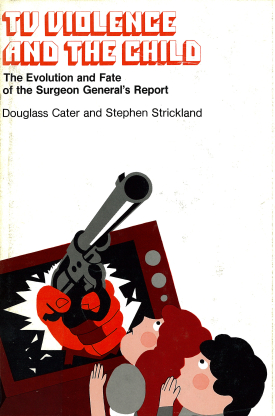
TV Violence and the Child
About This Book
In 1969, Senator John Pastore requested that the Surgeon General appoint a committee to conduct an inquiry into television violence and its effect on children. When the Surgeon General's report was finally released in 1972—after a three-year inquiry and a cost of over $1.8 million—it angered and confused a number of critics, including politicians, the broadcast industry, many of the social scientists who had helped carry out the research, and the public.
While the final consequences of the Report may not be played out for years to come, TV Violence and the Child presents a fascinating study of the Surgeon General's quest and, in effect, the process by which social science is recruited and its findings made relevant to public policy.
In addition to dealing with television as an object of concern, the authors also consider the government's effectiveness when dealing with social objectives and the influence of citizen action on our communication systems. Their overwhelming conclusion is that the nation's institutions are ill-equipped for recruiting expert talent, providing clear findings, and carrying out objectives in this area of delicate human concern.
DOUGLASS CATER is director of the Aspen Institute Program on Communications and Society.
STEPHEN STRICKLAND is director of the Washington, D.C., office of the Health Policy Program of the University of California, San Francisco.
Download
RSF Journal
View Book Series
Sign Up For Our Mailing List
Apply For Funding
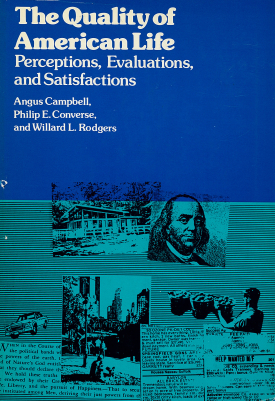
The Quality of American Life
About This Book
Considers how Americans define the quality of their life experiences, as expressed in their perceptions, evaluations, and satisfactions. Based on research conducted by the Institute for Social Research at the University of Michigan, the book uses data which are representative of the national population eighteen years of age and older, and employs the major social characteristics of class, age, education, and income. The authors cover such topics as the residential environment, the experience of work, marriage, and family life, and personal resources and competence. They also report on the situation of women and the quality of the life experience of black people.
ANGUS CAMPBELL is professor of psychology and sociology and director of the Institute for Social Research at the University of Michigan.
PHILIP E. CONVERSE is Robert C. Angell Professor of Political Science and Sociology and program director of the Center for Political Studies at the Institute for Social Research at the University of Michigan.
WILLARD L. RODGERS is senior study director of the Survey Research Center, Institute for Social Research, at the University of Michigan.
Download
RSF Journal
View Book Series
Sign Up For Our Mailing List
Apply For Funding
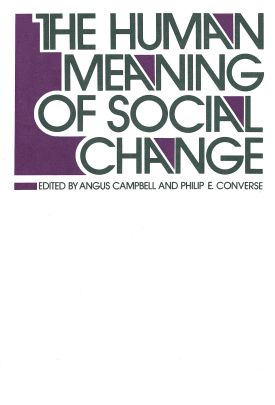
The Human Meaning of Social Change
About This Book
This book is a companion piece to Sheldon and Moore’s Indicators of Social Change. Whereas Indicators of Social Change was concerned with various kinds of “hard” data, typically sociostructural, this book is devoted chiefly to so-called “softer” data of a more social-psychological sort: the attitudes, expectations, aspirations, and values of the American population.
The book deals with the meaning of change from two points of view. First, it is interested in the human meaning which people attribute to the complex social environment in which they find themselves; their understanding of group relations, the political process, and the consumer economy in which they participate. Secondly, it discusses the impact that the various alternatives offered by the environment have on the nature of their lives and the fulfillment of those lives.
The twelve essays which make up the volume deal successively with the major domains of life. Each author sets forth an inclusive statement of the most significant dimensions of psychological change in a specific area of life, to review the state of present information, and to project the measurements needed to improve understanding of these changes in the future.
ANGUS CAMPBELL is professor of psychology and sociology and director of the Institute for Social Research at the University of Michigan.
PHILIP E. CONVERSE is Robert C. Angell Professor of Political Science and Sociology and program director of the Center for Political Studies at the Institute for Social Research at the University of Michigan.
CONTRIBUTORS: Angus Campbell, Philip E. Converse, John P. Robinson, Peter H. Rossi, Marvin B. Sussman, Robert L. Kahn, Rolf Meyersohn, George Katona, Herbert H. Hyman, Albert J. Reiss Jr., and Melvin Seeman.
Download
RSF Journal
View Book Series
Sign Up For Our Mailing List
Apply For Funding
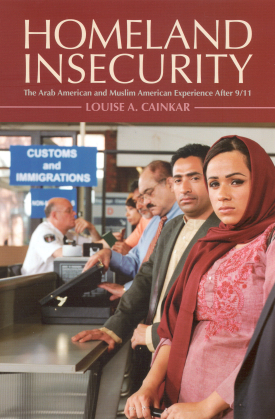
Homeland Insecurity
About This Book
In the aftermath of 9/11, many Arab and Muslim Americans came under intense scrutiny by federal and local authorities, as well as their own neighbors, on the chance that they might know, support, or actually be terrorists. As Louise Cainkar observes, even U.S.-born Arabs and Muslims were portrayed as outsiders, an image that was amplified in the months after the attacks. She argues that 9/11 did not create anti-Arab and anti-Muslim suspicion; rather, their socially constructed images and social and political exclusion long before these attacks created an environment in which misunderstanding and hostility could thrive and the government could defend its use of profiling. Combining analysis and ethnography, Homeland Insecurity provides an intimate view of what it means to be an Arab or a Muslim in a country set on edge by the worst terrorist attack in its history.
Focusing on the metropolitan Chicago area, Cainkar conducted more than a hundred research interviews and five in-depth oral histories. In this, the most comprehensive ethnographic study of the post-9/11 period for American Arabs and Muslims, native-born and immigrant Palestinians, Egyptians, Lebanese, Iraqis, Yemenis, Sudanese, Jordanians, and others speak candidly about their lives as well as their experiences with government, public mistrust, discrimination, and harassment after 9/11. The book reveals that Arab Muslims were more likely to be attacked in certain spatial contexts than others and that Muslim women wearing the hijab were more vulnerable to assault than men, as their head scarves were interpreted by some as a rejection of American culture. Even as the 9/11 Commission never found any evidence that members of Arab- or Muslim-American communities were involved in the attacks, respondents discuss their feelings of insecurity—a heightened sense of physical vulnerability and exclusion from the guarantees of citizenship afforded other Americans.
Yet the vast majority of those interviewed for Homeland Insecurity report feeling optimistic about the future of Arab and Muslim life in the United States. Most of the respondents talked about their increased interest in the teachings of Islam, whether to counter anti-Muslim slurs or to better educate themselves. Governmental and popular hostility proved to be a springboard for heightened social and civic engagement. Immigrant organizations, religious leaders, civil rights advocates, community organizers, and others defended Arabs and Muslims and built networks with their organizations. Local roundtables between Arab and Muslim leaders, law enforcement, and homeland security agencies developed better understanding of Arab and Muslim communities. These post-9/11 changes have given way to stronger ties and greater inclusion in American social and political life.
Will the United States extend its values of freedom and inclusion beyond the politics of “us” and “them” stirred up after 9/11? The answer is still not clear. Homeland Insecurity is keenly observed and adds Arab and Muslim American voices to this still-unfolding period in American history.
LOUISE A. CAINKAR is assistant professor of sociology and social justice at Marquette University.
RSF Journal
View Book Series
Sign Up For Our Mailing List
Apply For Funding
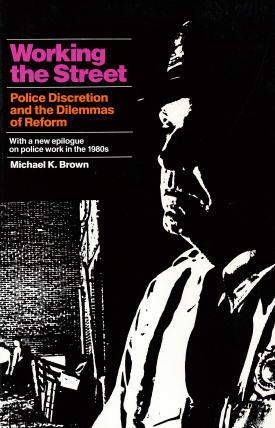
Working the Street
About This Book
Now available in paperback, this provocative study examines the street-level decisions made by police, caught between a sometimes hostile community and a maze of departmental regulations. Probing the dynamics of three sample police departments, Brown reveals the factors that shape how officers wield their powers of discretion. Chief among these factors, he contends, is the highly bureaucratic organization of the modern police department.
A new epilogue, prepared for this edition, focuses on the structure and operation of urban police forces in the 1980s.
"Add this book to the short list of important analyses of the police at work....Places the difficult job of policing firmly within its political, organizational, and professional constraints...Worth reading and thinking about." —Crime & Delinquency
"An excellent contribution...Adds significantly to our understanding of contemporary police." —Sociology
"A critical analysis of policing as a social and political phenomenon....A major contribution." —Choice
MICHAEL K. BROWN is emeritus professor of politics, University of California, Santa Cruz
RSF Journal
View Book Series
Sign Up For Our Mailing List
Apply For Funding
Pagination
- Previous page
- Page 48
- Next page
